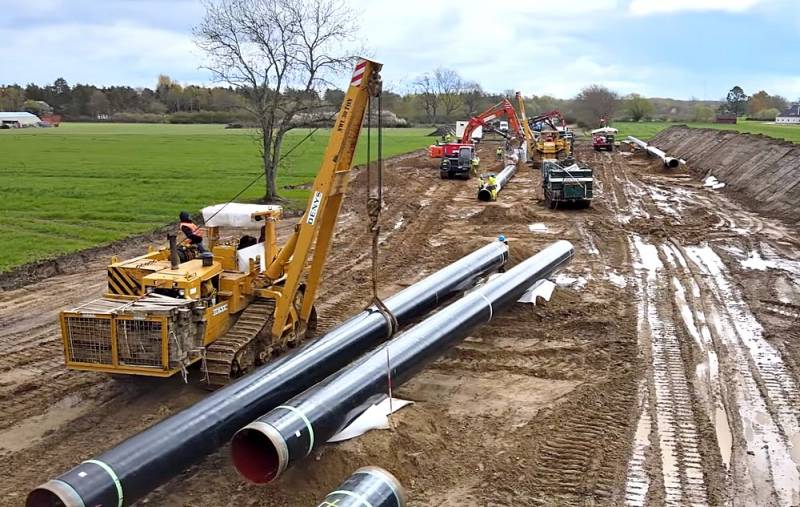Why Poland wants to leave Germany without Russian gas
The summer of 2021 has passed its equator, and therefore it is high time to prepare for the new heating season. However, the occupancy of underground gas storage facilities in Europe is at the lowest level in the last 10 years. At the end of June, the price for 1 cubic meters of "blue fuel" at the famous hub in the Netherlands reached $ 465. All this is a consequence of an acute shortage of natural gas on the European market, but despite the severity of the problem, at the request of Poland, access to 100% of the OPAL gas pipeline's capacity is still prohibited. Why is this happening, let's try to figure it out.
For reference, OPAL is a continuation of our first gas pipeline, Nord Stream, going through Germany and further to the Czech Republic, where it goes into a pipeline called Gazela, and then goes back to Germany. Also, Nord Stream has a NEL branch, designed exclusively for the needs of German consumers. OPAL's throughput capacity is 36 billion cubic meters of gas per year, and NEL's - 20 billion cubic meters. While all is well with the second branch, OPAL faced problems with European legislation long before Nord Stream 2. According to the norms of the Third Energy Package, 50% of the pipeline's capacity must belong to some other owner. Russian "Gazprom" as the only supplier refuses to accept this position of Brussels.
This issue has been the subject of constant disputes between Germany and Poland for many years. Berlin is trying to remove the pipeline it needs from under the restrictive EU regulations, but at the suit of Warsaw, the European Court finally sided with it a few days ago. So what are the Polish authorities striving for, and why a compromise was not possible even in such a difficult time for a united Europe?
All this is a direct consequence of the struggle between the two international alliances. On the one hand, this is an informal union of Russia and Germany, where our country acts as an exporter of natural resources, and Germany as the main "workshop in Europe". In order to confidently compete with products of American and Chinese production, German the economy a large amount of energy resources are required at an adequate price. In addition, Germany benefits from the status of the main gas hub in the EU from a geopolitical point of view. On the other hand, the United States and its main European ally Poland are in the unofficial alliance. Washington is interested in making its LNG more expensive, weakening Gazprom's position in the European energy market and reducing the competitiveness of German industrialists. Warsaw itself has long been aiming for Berlin's place as a regional gas hub, and also trying to catch up with Germany in terms of economic development. It is in this vein that all legal passions around Russian gas pipelines should be viewed.
So, why did the Polish authorities choose to continue to put pressure on OPAL, despite the difficult situation on the European gas market? Everything is simple: the rival Russian-German alliance launched a counterattack on the gas projects of Poland itself.
First of all, it should be noted that the bet on American liquefied natural gas was not very successful. Due to the current situation, it turned out to be profitable for LNG producers to take tankers to the Asian market, where prices are higher. The cost of one thousand cubic meters in European markets is now very uncomfortable, as we noted above. The prospects of the Baltic Pipe gas pipeline, through which the Poles intended to receive up to 10 billion cubic meters of gas a year from Scandinavia instead of the Russian one, also turned out to be a big question mark. As experts explain, production in Norway is falling, and therefore they do not have excess volumes of gas. So far, the contracted volumes of supplies at the level of 2 billion per year instead of 10 billion needed by Warsaw. But getting these 2 billion cubic meters is also not an easy task. Denmark suddenly woke up and met with hostility to the pipeline previously agreed upon in all respects, due to which the deadlines for the completion of construction and commissioning of the Baltic Pipe may shift to the right, and this will create very big problems for Poland.
The fact is that the Poles threatened to abandon purchases of Russian gas via the Yamal-Europe pipeline after 2022 as a means of political pressure on Moscow in negotiations on transit conditions, and now Gazprom itself can deprive them of their usual supplies. If Nord Stream 2 starts to work, the old Yamal-Europe pipeline going to Germany through Belarus and Poland may no longer be needed by the domestic state corporation. For these reasons, both Russian Streams pose a huge threat to the joint plans of the United States and Poland, so it should come as no surprise that the Polish authorities continue to strangle OPAL, despite the seeming absurdity of such policy... But winter will put everything in its place.

Information